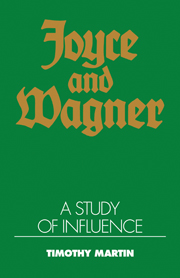4 - Redemption
Published online by Cambridge University Press: 05 November 2011
Summary
Das Ewig-Weibliche
Zieht uns hinan.
Goethe, Faust, Part IIA hundred cares, a tithe of troubles and is there one who understands me?
Joyce, Finnegans WakeThe Flying Dutchman, as we saw in chapter 3, elevates a longing for “home, house, hearth and – wife” (PW1.307) to the realm of metaphysics and begins to define the theme that, in one variation or another, would occupy Wagner's entire career: redemption. “Wagner,” wrote Nietzsche in The Case of Wagner, “pondered over nothing so deeply as over salvation: his opera is the opera of salvation.” Tannhäuser, a sinner and outcast like the Dutchman, ends his long exile in the Venusberg, reenters the temporal world, and attempts reconciliation with his chaste beloved and with the fellowship of Minnesingers. The quasi-divine Lohengrin forsakes the chilly perfection of Monsalvat and seeks redemption in the unquestioning love of a mortal woman. Tristan attaches a longing for death and redemption to his passion for Isolde. In Wagner's last two works the theme expands beyond the personal realm and the players change. A flawed king, in both the Ring and Parsifal, presides over a fallen world and awaits deliverance by a naive hero, a messiah. Perhaps Joyce remembered Nietzsche when, in 1917, he identified a figure in Wagner's operatic carpet:
There are indeed hardly more than a dozen original themes in world literature … Tristan und Isolde is an example of an original theme. […]
- Type
- Chapter
- Information
- Joyce and WagnerA Study of Influence, pp. 78 - 111Publisher: Cambridge University PressPrint publication year: 1991



